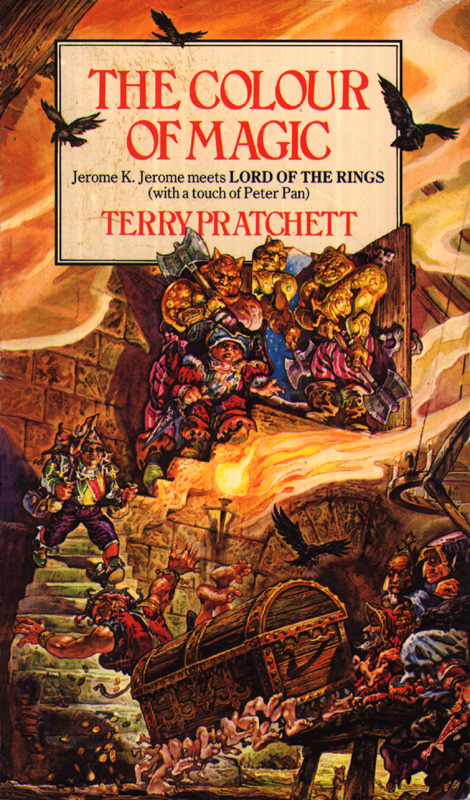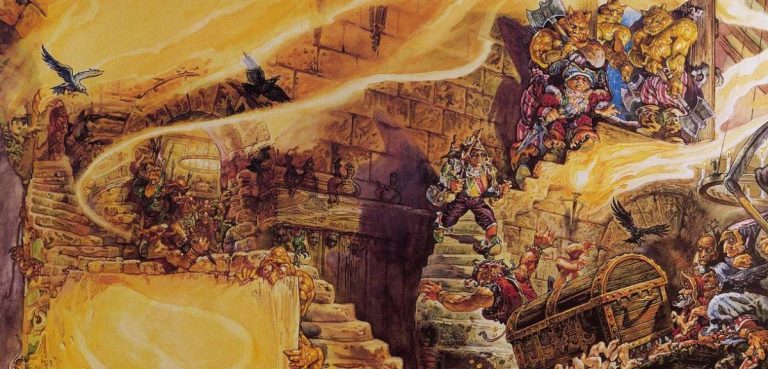
 Click to buy this book from Amazon
Click to buy this book from AmazonThis May, the world of fantasy writing lost a stalwart of the genre, Sir Terry Pratchett, creator of the Discworld and author of forty books in the series. The last novel, ‘The Shepherd’s Crown’, published at the end of August, brings the total up to forty one, and with it the end of the series. I am far from calling myself Pratchett’s number one fan, but I have read all of the books and have them lined up nicely on my bookshelf. With the end of the collection, I have decided that I am going to re-read the novels, in order, and really think about them, more than perhaps I have done before. I think I owe Sir Terry that much.
So why Discworld anyway? Well, I love it. I love Pratchett’s humour and I love his philosophy and I love how he could just find those words to describe something that you never would have thought could have been put into words. I love the in-jokes. I love the inversion of the expected into the unexpected, and how the way he mocks things is almost always gentle. I love Terry Pratchett because he so clearly, so dearly, loved what he did.
So then, to ‘The Colour of Magic’; the first Discworld book and the first I ever read. Picking it up and starting to read it feels like talking to an old friend. With the prologue, describing Great A’Tuin – the giant turtle on whose back the Discworld rests – it feels like coming home.
There is no introduction to a main character for the first eleven pages. Instead, the first introduction is to Ankh-Morpork, the city that is central to virtually every Discworld story. With the Wizard’s Quarter and Merchant’s Street and the richer citizens of Ankh demolishing bridges to the ablaze Morpork, by the time we finally meet main characters Rincewind and Twoflower, I feel as though a new reader already knows all they need to know about Ankh-Morpork. It’s not a nice place, not somewhere anyone in their right mind would want to live, but it is home for a myriad of characters we know and love, and this early description really made me smile in this re-read. I’m getting ahead of myself, of course, and I won’t say too much more but I really liked that Ankh-Morpork is so important at this early stage.
Rincewind and Twoflower are the main characters in this story and its sequel, ‘The Light Fantastic’, and when I read this the first time, I must admit I did not particularly care for them. I didn’t dislike them, but they weren’t my favourite fictional characters. This time around, I like them a whole lot more; Twoflower is much more proactive then I remember him being, especially by the time we get to the dragon cave. I really like that, despite everything, he still wants to believe in dragon and fantastical things. He is an ‘in-sewer-ants’ salesman with an imagination that can never be sated. I admire that.
Rincewind, the cowardly wizard who might be braver than he knows, has also grown on me. I never really thought about his lack of magical ability and it must have shaped him but this time around I find myself thinking about it a lot. I can’t imagine that a wizard in full possession of his faculties ever feels afraid. Is Rincewind only scared because he is aware of what he should be able to do? What he should be capable of? Is he more scared at his lack of ability than he is of whatever horrifying and terrifying situation he has found himself in? It’s a very sad idea when you think about it that way and one that endears Rincewind a whole lot more this time around.
One of my favourite things about Discworld is the way that Pratchett treats the gods, as if they were just another group of people who happened to live on the Disc, which I suppose they kind of are. In this book, the metaphor is stark; they play dice just as they play with the character’s lives. I like the concept of Fate and The Lady being the only ones that the people really seem to have any respect for. That sounds a lot like modern day to me – I know more people who believe in Fate and Luck than who truly believe in any god. It’s a clever touch, I think.
Lastly, I just really like how this story ends on a literal cliffhanger. I’m not a fan of cliffhangers in general – I’m far too impatient! – but when it is an actual, literal cliffhanger, I can’t really have a problem, can I?
Best quote:
“What happens after a ship goes over the Rimfall?” said Twoflower.
“Who knows?”
“Well in that case perhaps we’ll just sail on through space and land on another world.” A faraway look came into the little man’s eyes. “I’d like that.”
Call me sentimental but when I read that and thought about Terry Pratchett, I actually teared up. It’s making me sad now to think about it. I truly hope he’s just sailing on through.
Some of the coverage you find on Cultured Vultures contains affiliate links, which provide us with small commissions based on purchases made from visiting our site.

